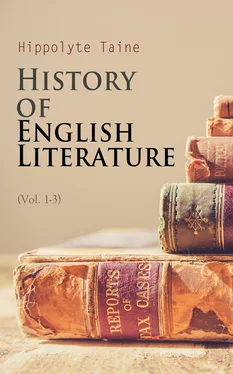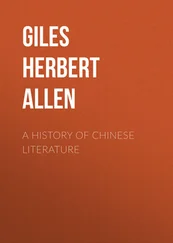Bring forth a story of the silent death
Of some forsaken virgin, which her grief
Will put in such a phrase, that, ere she end,
She'll send them weeping one by one away." [497]
Like a spectre about a tomb, she wanders forever about the remains of her destroyed love, languishes, grows pale, swoons, ends by causing herself to be killed. Sadder still are those who, from duty or submission, allow themselves to be married while their heart belongs to another. They are not resigned, do not recover, like Pauline in "Polyeucte." They are crushed to death. Penthea, in Ford's "Broken Heart," is as upright, but not so strong, as Pauline; she is the English wife, not the Roman, stoical and calm. [498]She despairs sweetly, silently, and pines to death. In her innermost heart she holds herself married to him to whom she has pledged her soul: it is the marriage of the heart which in her eyes is alone genuine; the other is only disguised adultery. In marrying Bassanes she has sinned against Orgilus; moral infidelity is worse than legal infidelity, and thenceforth she is fallen in her own eyes. She says to her brother:
"Pray, kill me....
Kill me, pray; nay, will ye
Ithocles. How does thy lord esteem thee? P. Such an one As only you have made me; a faith-breaker, A spotted whore; forgive me, I am one— In act, not in desires, the gods must witness.... For she's that wife to Orgilus, and lives In known adultery with Bassanes, Is, at the best, a whore. Wilt kill me now?... The handmaid to the wages Of country toil, drinks the untroubled streams With leaping kids, and with the bleating lambs, And so allays her thirst secure; whiles I Quench my hot sighs with fleetings of my tears." [499]
With tragic greatness, from the height of her incurable grief, she throws her gaze on life:
"My glass of life, sweet princess, hath few minutes
Remaining to run down; the sands are spent;
For by an inward messenger I feel
The summons of departure short and certain.... Glories
Of human greatness are but pleasing dreams,
And shadows soon decaying; on the stage
Of my mortality, my youth hath acted
Some scenes of vanity, drawn out at length
By varied pleasures, sweeten'd in the mixture,
But tragical in issue... That remedy
Must be a winding-sheet, a fold of lead,
And some untrod-on corner in the earth." [500]
There is no revolt, no bitterness; she affectionately assists her brother who has caused her unhappiness; she tries to enable him to win the woman he loves; feminine kindness and sweetness overflow in her in the depths of her despair. Love here is not despotic, passionate, as in southern climes. It is only deep and sad; the source of life is dried up, that is all; she lives no longer, because she cannot; all go by degrees—health, reason, soul; in the end she becomes mad, and behold her dishevelled, with wide staring eyes, with words that can hardly find utterance. For ten days she has not slept, and will not eat any more; and the same fatal thought continually afflicts her heart, amidst vague dreams of maternal tenderness and happiness brought to nought, which come and go in her mind like phantoms:
"Sure, if we were all sirens, we would sing pitifully,
And 'twere a comely music, when in parts
One sung another's knell; the turtle sighs
When he hath lost his mate; and yet some say
He must be dead first: 'tis a fine deceit
To pass away in a dream! indeed, I've slept
With mine eyes open, a great while. No falsehood
Equals a broken faith; there's not a hair
Sticks on my head, but, like a leaden plummet,
It sinks me to the grave: I must creep thither;
The journey is not long....
Since I was first a wife, I might have been
Mother to many pretty prattling babes;
They would have smiled when I smiled; and, for certain,
I should have cried when they cried:—truly, brother,
My father would have pick'd me out a husband,
And then my little ones had been no bastards;
But 'tis too late for me to marry now,
I'm past child-bearing; Tis not my fault....
Spare your hand;
Believe me, I'll not hurt it....
Complain not though I wring it hard: I'll kiss it,
Oh, 'tis a fine soft palm!—hark, in thine ear;
Like whom do I look, prithee?—nay, no whispering,
Goodness! we had been happy; too much happiness
Will make folk proud, they say....
There is no peace left for a ravish'd wife,
Widow'd by lawless marriage; to all memory
Penthea's, poor Penthea's name is strumpeted....
Forgive me; Oh! I faint." [501]
She dies, imploring that some gentle voice may sing her a plaintive air, a farewell ditty, a sweet funeral song. I know nothing in the drama more pure and touching.
When we find a constitution of soul so new, and capable of such great effects, it behooves us to look at the bodies. Man's extreme actions come not from his will, but his nature. [502]In order to understand the great tensions of the whole machine, we must look upon the whole—I mean man's temperament, the manner in which his blood flows, his nerves quiver, his muscles act, the moral interprets the physical, and human qualities have their root in the animal species. Consider then the species in this case—namely, the race; for the sisters of Shakespeare's Ophelia and Virgilia, Goethe's Clara and Margaret, Otway's Belvidera, Richardson's Pamela, constitute a race by themselves, soft and fair, with blue eyes, lily whiteness, blushing, of timid delicacy, serious sweetness, framed to yield, bend, cling. Their poets feel it clearly when they bring them on the stage; they surround them with the poetry which becomes them, the murmur of streams, the pendant willow-tresses, the frail and humid flowers of the country, so like themselves:
"The flower, that's like thy face, pale primrose, nor
The azure harebell, like thy veins; no, nor
The leaf of eglantine, whom not to slander,
Out-sweeten'd not thy breath." [503]
They make them sweet, like the south wind, which with its gentle breath causes the violets to bend their heads, abashed at the slightest reproach, already half bowed down by a tender and dreamy melancholy. [504]Philaster, speaking of Euphrasia, whom he takes to be a page, and who has disguised herself in order to be near him, says:
"Hunting the buck,
I found him sitting by a fountain-side,
Of which he borrow'd some to quench his thirst,
And paid the nymph again as much in tears.
A garland lay him by, made by himself,
Of many several flowers, bred in the bay,
Stuck in that mystic order, that the rareness
Delighted me: But ever when he turn'd
Читать дальше












